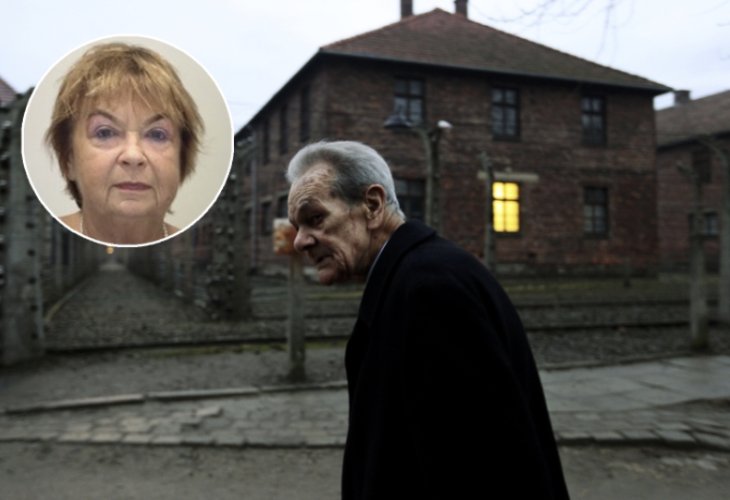"Grandpa Never Told Us Anything, and Then He Suddenly Opened His Mouth"
A 90-year-old man decides to share his childhood experiences of the Holocaust, an 80-year-old Jewish woman from Yemen recounts how her sister was taken from her, and a seventh-generation Jerusalemite from Mea Shearim reveals his life story. These are just a few examples of the thousand stories documented by Yad Sarah over the past 20 years. Volunteer Verda Bar-On, who manages the project in Jerusalem, shares her excitement.
 Inset: Volunteer Verda Bar-On (Illustration Photo: Shutterstock)
Inset: Volunteer Verda Bar-On (Illustration Photo: Shutterstock)Who among us doesn't have a life story? It seems that everyone who lives in this world carries with them a fascinating tale of events they experienced, people they met, wars they survived, or family connections they wove. When it comes to someone who is older, their life story becomes even more captivating, with a desire to pass it on to future generations.
However, despite the abundance of life stories, few people know how to put their memories into writing. Often, it happens too late, after the grandparent has passed away or is no longer able to share and recall, leaving the family to lament: "It's a shame he didn't tell us, that we didn't write it down, didn't document it..."
To address this need for documenting life stories, the Yad Sarah organization stepped in around twenty years ago. At that time, the organization initiated a project to put life stories into writing. The project was initially managed by Mrs. Lili Zohari, primarily for Holocaust survivors, allowing them to tell their life stories. The aim was not only to focus on the Holocaust but also to provide a full picture, allowing them to share everything – about what was before the war, about previous generations, and also about what happened to them after the war. Later, the project was managed with great dedication by Mrs. Rivka Avichail, who was even recommended by the volunteers to receive the Jerusalem Award, which she indeed received.
"The project was highly sought after," Verda Bar-On tells us, who currently heads the life stories project in the Jerusalem area – the largest of Yad Sarah's 30 branches across the country that operate the project. Verda herself joined the project about six years ago and manages the field on a voluntary basis alongside her dedicated partner, volunteer Sarah Elbag.
In the Book of Life
Verda herself didn't come from a writing or literature background. "I'm a nurse, a midwife by profession," she surprises, "and hold a master's degree in administration. In my past, I was one of the founders of Hadassah Mount Scopus and managed the delivery rooms there. I ended my role as the deputy head of nursing at Mount Scopus and as the division head of seven departments. I remember that when I was very young, while studying in nursing school, a kind of small, old carriage was placed by the hospital where Uri Lupolianski established 'Yad Sarah'. It was the very beginning of the organization that started in Lupolianski's home. I remember thinking then that it was a beautiful project, and perhaps one day when I retire, I would join it. A few decades later, that's exactly what I did. When I reached retirement age, I had a friend who also volunteered at Yad Sarah, and she told me: 'You're most suited for the Home and Community Services.' I approached the Home and Community Services Department, managed by Anat Ben-Zaken, and they offered me this role. In fact, it has no connection to the role I held in my life, beyond the fact that both are managerial roles, but I connect with it very much and feel a tremendous calling."
When Verda talks about the project, she notes that despite its 20-year existence, it has hardly undergone any changes, maintaining the same format. "Anyone who has ever tried to document life stories knows that there are many ways to do so," she explains, "Some document the story in groups, some with family, one can also document it in a film, or via a questions and answers format. We chose to document by personal story. The person who shares does not interview, and we do not interrupt the story with our own words or questions. It is a first-person narrative that the individual tells about themselves."
What is the process required to publish a book?
"The process is always conducted in the following manner: our volunteer meets the person telling the story, and he shares his story, in depth and in a detailed manner. We don't mind if he tells it in order or if it's jumbled, because in any case, the book goes through editing and proofreading afterward. Generally, the volunteer meets the elderly person about twelve times on average, and at the end, several more months of work is required until the book is ready. In most cases, preparing the book takes at least eight months. At the end of the work, the storyteller receives the book in a single copy and, along with it, a disc through which they can print additional copies at any printing house."
What has changed over the years, according to Verda, is the fact that the project is no longer just for Holocaust survivors. "Over the recent years, many Holocaust survivors are no longer with us, and those who remain don't necessarily want to share their stories. There are still some Holocaust survivors, but much fewer. Therefore, our project is now suited for anyone who wants it."
 (Photo: Shutterstock)
(Photo: Shutterstock)And who are those interested in writing their life stories?
"Who isn't?" she answers with a question, "Almost everyone wants to tell, and almost everyone has something to tell. But in principle, we offer this service to older people, some even in their nineties. Some tell us: 'I never shared my story, now this is the first time I'm opening my heart...'
What makes them come to you?
"The storytellers come to us for various reasons, after hearing about us from neighbors or friends, family members, or social workers. In the initial stage, we request to have a personal conversation with each of the storytellers. Even if the daughter contacts us to write about her mother, we ask to speak directly with the mother to see if a book can truly be made from it. Sometimes the family members really want the grandfather to tell his story, but he is in a very difficult state and not capable. There are other cases where family members seek activity for the grandfather, but he's not interested in sharing, so it's not fitting. Therefore, initially, we conduct a phone interview lasting about 20 minutes where we hear from the storyteller the things important to them and explain the process. Generally, we strive not to reject those who approach us and not to turn people away. Our aim is to allow everyone to share their stories and document them."
The Story of Life
Verda notes that each year they publish, just through the Jerusalem department, dozens of books. "In my role, I go through all the books and find myself just fascinated. There are amazing, touching, and inspiring stories there that encompass a variety of subjects – immigration stories, stories about building the country, stories about the War of Independence, and also stories of Holocaust survivors.
"These stories are essentially the stories of our country. It's always interesting to read them and always new and intriguing things are revealed to me through them. Just recently, we edited a book for a Yemeni woman whose sister simply 'disappeared,' and so many interesting details were mentioned. I read these books and feel we are not just writing personal stories here, but truly documenting books of our nation. We write about secular and religious people, about all communities and sectors."
Is the structure of the books uniform?
"Not necessarily; usually, the stories start in chronological order – with memories from the parents' home and childhood years, but some particularly want to begin with the most significant story they experienced in their lives. This story is usually related to a son or daughter who passed away, but not always. There was a woman who asked to start her book with stories about her father, who was responsible for guarding a grave somewhere in the country. He guarded the grave for years, and for her, this is a key aspect of her life. Another wanted to start his story with the moment he immigrated to the country on a clandestine immigrant ship. There was also someone who asked to go in reverse order – to start in his later years, as a father and grandfather to grandchildren and great-grandchildren, and then to go backward. Of course, we allow each one to do as they wish; after all, it's their book. The stories can be very long; to hear everything, a lot of time is required. For each book, one volunteer may be enough or up to four or five volunteers might be needed."
And who are the people volunteering in your project?
"In Jerusalem alone, we have about 70 volunteers specifically involved in life stories. But not all the volunteers accompany the entire process. Some only listen, some only engage in the editing field, but there are also those who do everything – listen to the storytellers, write the stories, edit them, and even arrange the photos. Most volunteers are relatively older people, and that's a good thing because they have the patience to listen to someone who speaks slowly or not clearly and sometimes also forgets."
And the most emotional moments are when the book is published and handed to the excited elderly person. "The life stories leave us as regular books, bound in a printing house," explains Verda, adding with excitement: "Recently, the national life stories project celebrated the release of the thousandth story. A thousand pieces of life that will remain with the families forever."

